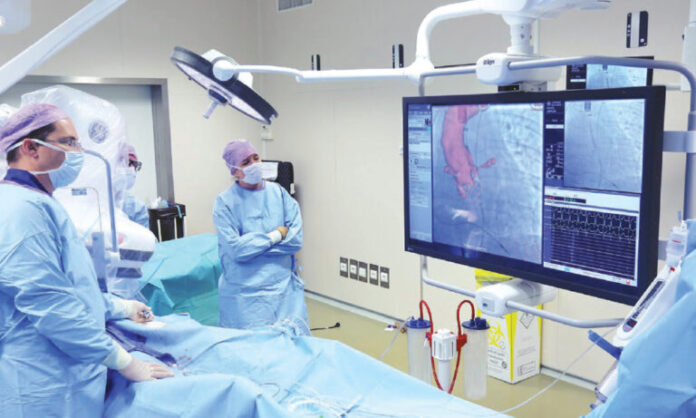At Advanced Cardiology, we have a team of highly experienced heart specialist Sydney who are dedicated to providing you with the highest quality and most up-to-date cardiovascular care. We have offices in Sydney city, North Sydney, Parramatta and Baulkham Hills. Our goal is to provide you with the best possible medical treatment for your heart condition. From our office locations in Sydney city, North Sydney and Parramatta, we can also see patients throughout greater Sydney, including Penrith, Castle Hill, Hornsby and Gosford, and regional NSW areas such as Bathurst, Orange and Dubbo.
Heart attack
- When a blood clot blocks the blood flow to a part of your heart, it’s called a heart attack.
- The most common symptoms are chest pain and shortness of breath. Other symptoms include sweating, nausea and vomiting.
- If you think you have a heart attack: call triple zero immediately (000), or go straight to A&E if it’s after hours or on the weekend.
 Angina
Angina
Angina is chest pain or discomfort when the heart muscle does not receive enough oxygen-rich blood. This is usually because of a blocked artery or narrowed arteries in the heart, which can result from coronary artery disease (CAD). Angina is also a symptom of heart failure and arrhythmia. While some people feel angina only during physical activity, others may feel it at rest. In most cases, however, it comes on after you’ve been physically active and then subsides when you rest. It’s important to note that while angina feels like an ache or pressure in your chest, it’s not the same as a heart attack. A heart attack occurs when part of your heart muscle dies due to a lack of oxygen-rich blood; angina causes pain but doesn’t lead to permanent damage or death unless left untreated over time.
Heart Failure
Heart failure is when the heart muscle cannot pump enough blood to meet the body’s needs. Heart failure can cause symptoms such as shortness of breath and fatigue. Heart failure is a severe condition that requires treatment.
Coronary Artery Disease
Coronary artery disease, or CAD, is a condition in which plaque builds up inside the arteries that supply blood to your heart. Plaque is made of cholesterol, fat and other substances found in the blood. The buildup narrows the arteries and makes it harder for blood to flow through them. As a result, not enough oxygen-rich blood reaches your heart muscles. Coronary artery disease is usually treated with medications to lower cholesterol levels and increase good cholesterol (HDL) levels; medications to control blood pressure; lifestyle changes such as quitting smoking or losing weight; procedures such as angioplasty with stenting and bypass surgery; medicine called beta blockers that help slow down your heartbeat if you have abnormal heart rhythms (arrhythmias); and implantable electronic devices that can record your heartbeat rate at all times so doctors can monitor it closely.
Peripheral Vascular Disease
Peripheral vascular disease (PVD) is when the arteries in your legs become narrowed or blocked. It can cause pain and numbness in the legs, as well as swelling of the feet and ankles, which can lead to ulcers. PVD is caused by plaque buildup in the arteries. This happens over time as you age, but it may also be due to other conditions, such as high cholesterol or diabetes.
Atrial Fibrillation & Supraventricular Tachycardia
Atrial fibrillation (AF) is the most common type of potentially irregular severe heart rhythm called arrhythmia. If you have AF, your heart’s top chambers (the atria) beat chaotically. This leads to a speedy and irregular heartbeat that can increase your risk of stroke, blood clots in the lungs or leg veins, heart failure and other serious complications.
Symptoms can include:
- Swelling in your ankles or legs; swelling that doesn’t go away when you rest
- Shortness of breath when you’re active, especially with exercise or exertion
Hypertension (High Blood Pressure)
Hypertension is a condition in which the blood pressure in your arteries is elevated. Your heart works to pump blood through your body, and it depends on the amount of pressure to do so effectively. The blood pressure determines how easily it can flow through your arteries. If you have high blood pressure, there will be increased resistance against the flow of blood through your body, which may cause serious health complications and even lead to death if left untreated. Hypertension can develop due to several reasons, such as age, gender and genetics, among others. As we grow older, our bodies tend to become less elastic and stiffer over time; this makes it harder for us to expand our vessels under high pressures, like when we exercise or go upstairs etc. A sedentary lifestyle contributes to hypertension as well because it builds up fat around our waist area, thus increasing abdominal obesity levels (which causes further damage).
We are a group of cardiologists in Sydney committed to providing you with the highest quality and most up-to-date cardiovascular care.
We are a group of cardiologists in Sydney committed to providing you with the highest quality and most up-to-date cardiovascular care. We have been established for over 20 years and have treated many patients suffering from heart disease, hypertension and other conditions.
Our team has extensive experience treating many types of cardiac conditions, including:
- Heart attack (myocardial infarction)
- Angina (chest pain)
- Hypertension (high blood pressure)
- Cardiomyopathy – this is when your heart muscle becomes weak or enlarged
Conclusion
If you’re looking for a cardiologist in Sydney, we hope we’ve been able to help you. We are a group of cardiologists committed to providing you with the highest quality and most up-to-date cardiovascular care. If you have any questions or need more information, please don’t hesitate to contact us today! Our holter monitor test Sydney is available at economical rates.
Related Websites
Articles on Smartyblogs
Articles on Yycblogs
Articles on Cmeblogspot
Articles on Blogs-nation


